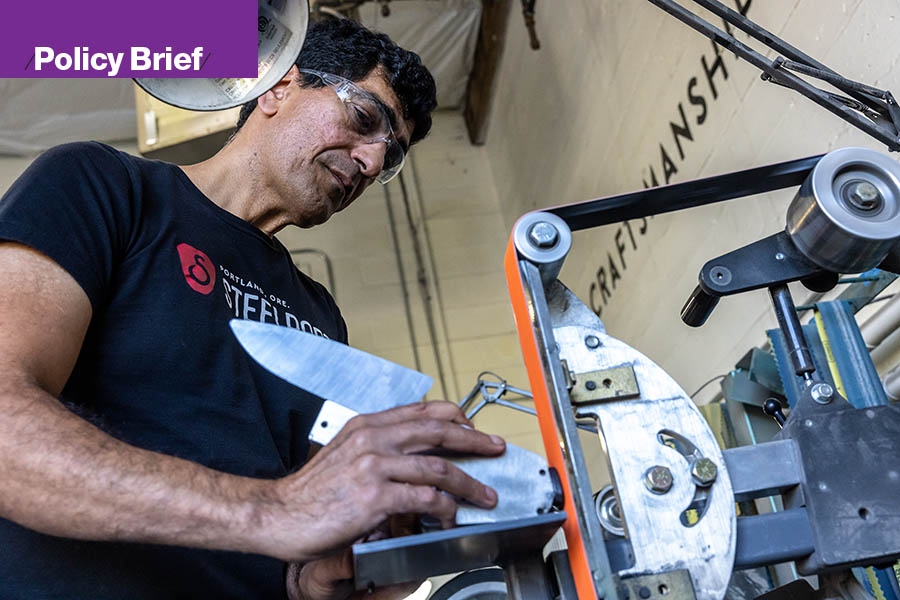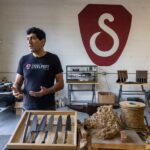Ron Khormaei, founder and CEO of STEELPORT Knife Co., on the rebirth of artisan-based industries
We are seeing a rebirth of artisan-based industries giving renewed attention to the traditional basis for American ingenuity. This provides an opportunity in Oregon to leverage an existing supportive ecosystem and customers supporting the trend through their purchases.
“Shop Local” is a well-known and growing agenda, often referring to supporting either smaller Main Street businesses, restaurants and retail establishments or buying “Made in the USA” products supporting American industry from cars to clothing. But what if you could do both in a single purchase?
We are seeing that the same local business is also often a traded-sector business, selling their locally made products around the country and potentially the world. We are at the epicenter of the art of craft at scale. More than simply Shop Local or Made in the USA, “Built Local” has a number of positive effects and impacts on the people and places that we hold so dear.
In the current environment, buying locally made goods has significant advantages beyond supporting fellow citizen artisans who put their energy into making a new vision of commerce a reality. Starting with a local root has led to large successful brands like Patagonia, Leatherman, Columbia and Filson, and has inspired countless startups like my own experiences with FINEX and STEELPORT.
The main benefit comes down to one thing: relationships. Built Local products leverage the following major proximity advantages to deliver unique high-quality products:
- Customers: The team has a high level of understanding of the needs and feels a sense of obligation to their neighbors.
- Suppliers: Easier communication and mutual pride to ship the highest-quality products possible.
- Retailers: Local, smaller retailers understand the values and are invested in completing this ecosystem and getting these products in front of interested customers.
First, let’s talk about the advantage of being close to your customers. In my experience building businesses in Portland, including recently with FINEX Cast Iron Cookware and currently, with STEELPORT Knife Co., I have experienced how small teams take pride in bringing the best new products to the marketplace. To them, customers are not unknown buyers with cash, but they are friends, family and people known personally. Founders and team members are not motivated by money but by being able to share the love of their craft and vision with the rest of the community.
Because local artisans and makers are close to the people they create products for, they can optimize the product more efficiently. Being close to customers allows a local team to truly understand their needs. The team is able to pay close attention to functional, thoughtful details that are easy to miss if a company is far removed from their customer. Instead of creating cookie-cutter, mass-produced products, local artisans are drawn to create products that are truly heirloom quality without needing to be dressed up in layers of hollow, insincere advertising.
Such local companies are uniquely poised to bring innovative ideas instead of merely duplicating an existing concept a million times.
Next to highlight are the benefits of working with local, American suppliers. By working with partners within the country, companies can solve problems with the best solutions instead of outsourcing it overseas. This not only optimizes the product but also ensures that it was built with materials that are safe and also ethically sourced. It’s easy to make something overseas at an incredibly low cost. However, it’s much easier for local companies to ensure the best product by working with known, high-quality, U.S.-sourced components.
When the maker is close to suppliers, each party knows the business practices of the other. They understand the needs of each company better, and both companies benefit from the arrangement. The result is a customized product that better fulfills the company’s aspirations. It’s not just a product; it’s a solution built with materials and labor practices that are U.S.-made and safe for everyone involved.
Another advantage is being able to control and manage shipping. Transport should not be considered simply a cost but rather a quality tax that impacts each step of the product development cycle. Proximity allows for quick fixes and real improvements in the product. As opposed to cost and time being out of a company’s control when suppliers are far away and products sit on shipping containers for a few months, when companies work with local suppliers, they don’t have to worry about delays due to international strife, weather or a shipping channel being impassable. Such a relationship quickly leads to a trusting ecosystem.
Relationships are what power local companies. This carries over to the local retailers, which create a premade line to the customers who understand the value of such a chain. Startups that develop their products close to their customers aim to empower the customers themselves. Instead of selling empty promises, local artisans share the details of their development and invite customers to engage in a conversation about all aspects of the product, including design and implementation. In the case of STEELPORT, for example, its strength has come from building a community among customers, suppliers and like-minded makers.
The scale and structure of offshore manufacturing might be significantly ahead; however, when it comes to supporting face-to-face contact and effective communication, it is still hard to beat local relationships. Often these investments are significant and require managerial vision to pull off but, in the long run, pay for themselves many times over. In the case of STEELPORT and its Made in America carbon steel knives, we have been building a trusting ecosystem of chefs, restaurant owners, retailers, manufacturers of cookware, customers who care about premium quality, and the list goes on.
So the next time you consider purchasing, consider going with Built Local. With strong relationships and a process foundation, Built Local is more than a feel-good slogan. It allows for building long-term brands that remain beacons for future companies and set high standards for customers to expect.
Ron Khormaei is the founder and CEO of STEELPORT Knife Co; co-founder of FINEX Cast Iron Cookware. He is also a faculty member at Oregon State University and an advisor to multiple local brands.







